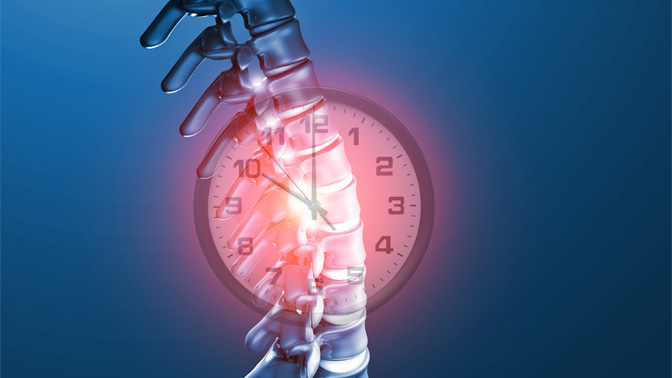
Your worst nightmares have come true. You have undergone surgery in an attempt to relieve your debilitating back pain. And, at first, things did get better. But now, your symptoms are back—and even worse than before.
Pain in the neck, back or lower back, along with numbness or weakness in the arms or legs, can result from damage caused by compression of the spinal cord, also called degenerative cervical myelopathy (DCM). A number of conditions can cause spine abnormalities that lead to spinal cord compression, including injury, spinal tumor, rheumatoid arthritis or infection.
Surgical decompression—surgery to relieve pressure and pinching of the spinal cord—is the mainstay treatment in patients with DCM, as it can minimize further damage, and improve patients’ physical symptoms and quality of life. However, it has been shown that these improvements may vary significantly depending on a number of factors such as the severity of damage, duration of symptoms and age. Moreover, even after a flawless surgical procedure, patients’ symptoms can worsen within the first 24 hours following surgery.
It is believed that the body’s immune system may be responsible for this worsening of symptoms, due in large part to increased inflammation at the site of surgery. Novel strategies to prevent these “secondary” injury processes may lead to improved outcomes in patients who receive surgical treatment for DCM.
In an effort to uncover the factors that govern whether surgical decompression surgery is successful, Krembil Senior Scientist Dr. Michael Fehlings used an animal model of DCM. The model enabled the research team to compare the effects of surgical decompression surgeries done soon after injury with those done three months after injury.
In the early decompression group, reduced inflammation and improved function in the upper and lower limbs were observed within the first few weeks after surgery. However, when surgical decompression was delayed, there was prolonged activation of immune cells and increased inflammatory markers. Furthermore, delayed surgical decompression led to an increased incidence of complications and function did not return to the same extent in the upper and lower limbs.
Using existing clinical data, the research team confirmed these results in human patients with moderate to severe DCM. Of the 504 patients considered, when surgical decompression was performed within 6 months of symptom onset, patients recovered better than when the surgery was delayed for longer periods of time.
“To our knowledge, this is the first study that demonstrates the relationship between surgical intervention timing and immune system activation after surgery,” said Dr. Fehlings. “Our results suggest that patients who have experienced symptoms for a longer period of time are more likely to achieve suboptimal surgical outcomes—and this is exactly what we see in the clinic.”
This study underlines the importance of early diagnosis and surgery in DCM patients. Furthermore, reducing inflammation post-surgery may represent a novel therapeutic strategy to improve DCM patient recovery after surgical decompression.
This work was supported by the Cervical Spine Research Society, the Canadian Institutes of Health Research, and the Toronto General & Western Hospital Foundation. MG Fehlings is the Halbert Chair in Neural Repair and Regeneration.
Vidal PM, Karadimas SK, Ulndreaj A, Laliberte AM, Tetreault L, Forner S, Wang J, Foltz WD, Fehlings MG. Delayed decompression exacerbates ischemia-reperfusion injury in cervical compressive myelopathy. JCI Insight. 2017 Jun 2. doi: 10.1172/jci.insight.92512.




